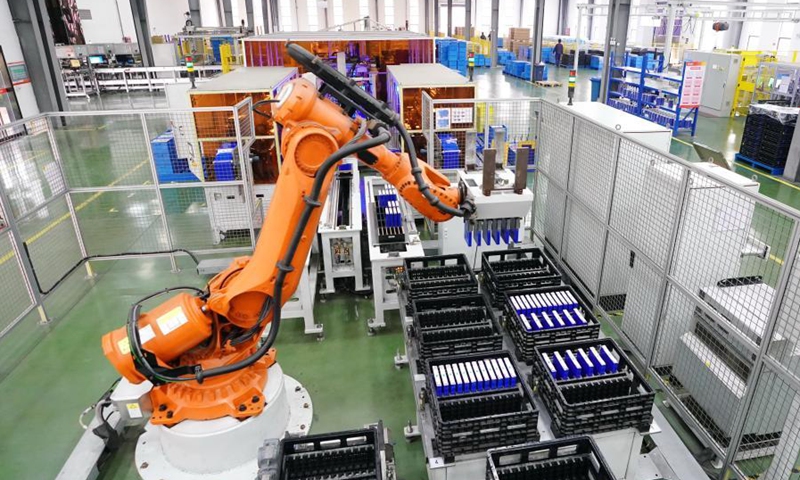Industrial upgrade in China's factory zone Dongguan eases labor shortages
By GT staff reporters in Dongguan Source: Global Times Published: 2020/12/20 22:21:27

A robot works at a lithium battery factory in Tangshan, north China's Hebei Province, Nov. 29, 2020. Lithium battery production has recently become a leading industrial sector in Lubei District of Tangshan. It is estimated that local manufacturers turn out 780 million yuan (about 118 million U.S. dollars) worth of lithium batteries every year. (Xinhua/Yang Shiyao)
A push for industrial upgrading has led to an increase in automated production lines in Dongguan, one of the world's leading factory zones, in South China's Guangdong Province, helping to address persistent labor shortages.
Manufacturers in the city, a key manufacturing center whose products account for 0.95 percent of China's GDP each year, said machines and robots are helping them address labor shortages as China's population ages and wages rise.
Even as some companies in labor-intensive sectors have increased difficulty in hiring staff, many have avoided this problem by moving toward the higher end of the industry and value chains.
As production resumed in China, a post in November stating that companies in Dongguan are finding it difficult to fill job vacancies with a salary of 7,000 yuan ($1,071) per month, far exceeding the national average of around 4,500 yuan, grabbed many views on social media platforms.
The labor shortage is also structural - young rural migrant workers are less inclined to accept production line jobs than their predecessors, considering such jobs to be beneath them.
However, entrepreneurs in Dongguan said the push to automate has helped.
Chen Liang, general manager of Dongguan Jinconn New Material Holdings Co, a private company that makes magnetic materials, said his plant only employs 120 workers to do what 300 would have to do without automation.
"At our company, 120 workers are permanent, and 50 are temporary staff who only work at busy times," Chen told the Global Times on Sunday.
Dongguan, the world's factory for furniture, smartphones, textiles and paper, has about 5 million rural migrant workers on its production lines.
Liu Fengzhen, an executive of De Rucci Healthy Sleep Co, a mattress and bed linen maker based in Dongguan, said labor productivity has risen 22 percent per worker since the company introduced Industry 4.0 smart manufacturing equipment in 2017.
"Previously, each of our workers could produce five mattresses a day. Now, it's six, thanks to automation," Liu said.
At De Rucci, automation installations are added and continually optimized as business grows. The transportation of mattresses, which is now semi-automated, will be done by industrial robots when the current round of technical innovation is completed in 2021.
Inside the factory of Maisto, a world-leading maker of auto models that exports car models to 146 countries and regions, automatic mini transport robots could be seen carrying parts among different production lines.
Factory manager John Ng told the Global Times that the company has applied many such robots to address labor shortages and increase efficiency.
Maisto once employed 12,000 workers. But with the drive toward automation in recent years, the figure has been cut to about 2,000.
"For the past several years, new media platforms have always gone to great lengths to spread rumors that Donguan is doomed because of a mass exodus of labor… Those were irresponsible people spreading false news to grab people's eyeballs," said a taxi driver surnamed Wan who has lived in the city during the past decade.
"The city is as prosperous as it used to be, and perhaps more so," Wan told the Global Times.
Conditions vary among Dongguan's 180,000 manufacturing companies, but the city government is pushing an ambitious plan to improve the vocational skills of as many as 1 million workers by end of this year, according to a report by the Xinhua News Agency.
Chinese companies' pursuit of automation is not blind, Chen said. "We are following a gradual learning curve, and robots and machines are added only when needed," Chen said, noting that there is a marked difference with some Western conglomerates that added robots as a fad, which drastically increased their operating costs.
"The key here [in Dongguan] is that companies take a very practical approach and retain jobs where workers can outperform machines," Chen said. "We don't seek full automation in one swoosh, we do it step by step."
Newspaper headline: Industrial upgrading eases Dongguan labor woes